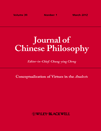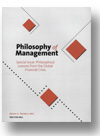
Sophia-Coleccion de Filosofia de la Educacion
metrics 2024
Bridging Theory and Practice in Educational Philosophy
Introduction
Sophia - Colección de Filosofía de la Educación is a distinguished academic journal published by the Salesian Polytechnic University of Ecuador, dedicated to exploring the intersections of philosophy and education. With an ISSN of 1390-3861 and an E-ISSN of 1390-8626, this Open Access journal has been freely accessible since 2009, promoting wider dissemination of ideas within the field. It proudly contributes to the academic discourse in both the Arts and Humanities and Philosophy, holding a commendable Q2 quartile ranking in both categories as of 2023. As of the current publishing period, which spans from 2019 to 2024, the journal stands out with its Scopus rankings indicating a respectable position within the 74th percentile for Philosophy and the 58th for Arts and Humanities (miscellaneous). This makes it an essential source for researchers, professionals, and students keen on deepening their understanding of philosophical approaches to education and its practical implications.
Metrics 2024
 0.21
0.21 0.70
0.70 0.40
0.40 4
4Metrics History
Rank 2024
Scopus
IF (Web Of Science)
JCI (Web Of Science)
Quartile History
Similar Journals

JOURNAL OF CHINESE PHILOSOPHY
Exploring the Depths of Chinese ThoughtThe Journal of Chinese Philosophy, published by Brill, stands as a pivotal platform for the exploration and dissemination of research within the realm of philosophy, particularly focusing on traditional and contemporary Chinese thought. With a commitment to academic excellence, this journal has earned a reputation for its rigorous scholarship, as reflected in its Q2 category ranking in the field of Philosophy on Scopus, currently positioned at rank #337 out of 806 in Arts and Humanities. Since its inception in 1973, the journal has consistently engaged scholars, professionals, and students alike, featuring articles that deepen understanding and provoke critical discourse among various philosophical traditions. Although it is not open access, the journal's influential contributions and comprehensive reviews of emerging trends in Chinese philosophy make it an essential resource for anyone engaged in the study of this rich and diverse field. For subscription and access details, interested readers can refer to the publisher's website.

Philosophy of Management
Exploring the Depths of Management ThoughtPhilosophy of Management, published by Springer International Publishing AG, is an esteemed academic journal dedicated to advancing the discussion and exploration of philosophical perspectives in management practices and theories. Established in Switzerland, this journal has become a pivotal forum for scholars, practitioners, and students alike who are interested in the intersection of business practices and philosophical thought. With a comprehensive focus across multiple disciplines, including Business and International Management, History and Philosophy of Science, and Organizational Behavior, the journal enjoys a competitive reputation, evidenced by its quartile rankings in categories such as Q1 and Q2 for 2023. The journal encompasses years of valuable contributions from 2003 to 2024, aiming to stimulate critical thinking and foster innovative ideas within the field. Researchers seeking to publish their work in a prestigious outlet with an engaged readership will find the Philosophy of Management to be an essential platform, affirming its importance in the wider academic community.

Philosophy of Music Education Review
Exploring the Intersections of Sound and ThoughtThe Philosophy of Music Education Review, published by Indiana University Press, is a premier academic journal dedicated to advancing the interdisciplinary discourse surrounding music education, philosophy, and the arts. With a notable impact factor dynamic, this journal has established itself as a significant voice, achieving Q1 rankings in both Music and Philosophy, and a Q3 classification in Education, reflecting its broad appeal and scholarly contribution. Covering prolific topics from 2019 to 2024, this journal offers insightful articles and critiques that stimulate critical thinking and enhance pedagogical practices within the realm of music education. It boasts impressive Scopus rankings in relevant categories, placing it favorably among its peers and showcasing its importance in the academic landscape for educators, researchers, and students alike. While it is not an open access journal, the philosophy and studies within its pages remain pivotal for those invested in the cognitive, emotional, and cultural dimensions of music teaching and learning.

Filozofska Istrazivanja
Fostering Critical Engagement in PhilosophyFilozofska Istrazivanja is a distinguished open-access journal dedicated to the field of philosophy, published by the Croatian Philosophical Society. Since its inception, the journal has provided a platform for the dissemination of philosophical research, fostering scholarly dialogue and critical engagement within the discipline. With an ISSN of 0351-4706, this journal has been freely accessible to readers since 2005, reflecting its commitment to promoting knowledge and accessibility in the academic community. As measured by its Q4 in Philosophy category quartile for 2023 and its Scopus ranking of #770/806 in the Arts and Humanities field, Filozofska Istrazivanja continues to serve as a crucial resource for researchers, educators, and students alike seeking to explore contemporary philosophical issues and debates. The journal encourages submissions that contribute to various philosophical subfields, enriching the discourse and providing new insights that can elevate the understanding of philosophical thought.

Beytulhikme-An International Journal of Philosophy
Empowering Minds Through Open Access ScholarshipBeytulhikme-An International Journal of Philosophy is a distinguished publication dedicated to the exploration and dissemination of philosophical scholarship. Published by Beytulhikme Felsefe Cevresi, this journal serves as a platform for researchers, academics, and students to engage with contemporary philosophical discourses and historical inquiries. With its commitment to open access, Beytulhikme ensures that valuable philosophical insights are readily available to a global audience. The journal welcomes a diverse range of submissions, including theoretical papers, critical reviews, and interdisciplinary work that reflects the dynamic nature of philosophical research today. Located in Ankara, Turkiye, Beytulhikme plays a pivotal role in fostering a deeper understanding of philosophical concepts and methods, thus contributing to the academic community and enriching scholarly dialogue. As a key resource for professionals in the field, Beytulhikme not only encourages innovative thinking but also promotes a comprehensive examination of both Eastern and Western philosophical traditions.

UNIVERSITAS-Monthly Review of Philosophy and Culture
Fostering Dialogue Between Philosophy and CultureUNIVERSITAS-Monthly Review of Philosophy and Culture is a distinguished journal dedicated to exploring the intricate interplay between philosophical thought and cultural phenomena. Published by UNIVERSITAS, this journal serves as a crucial platform for scholars, researchers, and students interested in the diverse dimensions of philosophy and its impact on contemporary culture. With its ISSN number 1015-8383, the journal curates a selection of rigorously peer-reviewed articles that contribute to the enrichment of critical discourse in philosophy and cultural studies. Although it does not currently offer Open Access, the journal maintains a commitment to quality and relevance in its publications. Based in Taipei, Taiwan, UNIVERSITAS-Monthly Review of Philosophy and Culture seeks to bridge theoretical frameworks with real-world cultural contexts, making it an invaluable resource for anyone aiming to deepen their understanding of these fields.

Paideusis-The Journal of the Canadian Philosophy of Education Society
Cultivating Ideas for Tomorrow's EducatorsPaideusis - The Journal of the Canadian Philosophy of Education Society serves as a vital platform for scholarly discussion and inquiry within the field of philosophy of education. Published by the Canadian Philosophy of Education Society (CPES) and embracing an Open Access model since 1987, this journal fosters an inclusive environment for researchers, educators, and students seeking to engage with contemporary educational theories and practices. With an emphasis on philosophical reflection and critical analysis, Paideusis invites contributions that challenge and extend our understanding of educational paradigms, making it a crucial resource for those committed to advancing discourse in education. The journal not only aims to promote intellectual engagement but also to cultivate a community where new ideas can flourish, ultimately shaping the future of educational thought and practice.

Teoria-Rivista di Filosofia
Cultivating Diverse Perspectives in Philosophical InquiryTeoria-Rivista di Filosofia is a distinguished academic journal published by EDIZIONI ETS, based in Pisa, Italy. With a focus on philosophical discourse, this journal is a valuable resource for researchers, professionals, and students in the field of philosophy. Having achieved a commendable Q3 ranking in the 2023 category quartiles, Teoria stands out in the competitive landscape of philosophy journals, with a Scopus rank of #612 out of 806, placing it in the 24th percentile. Although currently classified as a non-open access publication, it frequently addresses cutting-edge themes and challenges within philosophical research, promoting rigorous analysis and diverse perspectives. The journal spans various topics across multiple issues from its inception in 2011 to its ongoing publications scheduled through 2024, making it a relevant venue for contemporary philosophical inquiry. The journal aims to foster scholarly communication and stimulate critical debates, contributing significantly to the global philosophical landscape.

Phares-Revue Philosophique Etudiante de l Universite Laval
Advancing Intellectual Rigor in the Heart of QuebecPhares-Revue Philosophique Etudiante de l'Université Laval, ISSN 1496-8533, is a prestigious academic journal published by the Faculty of Philosophy at Université Laval, situated in the heart of Quebec, Canada. This journal serves as a vital platform for emerging scholars in the field of philosophy, showcasing innovative ideas, research findings, and critical discourse. As a crucial resource for researchers, professionals, and students alike, *Phares* encourages the exploration of diverse philosophical topics, promoting intellectual engagement and rigor. Although it currently does not provide open access, the journal's commitment to fostering a rich academic community remains paramount. With its high academic standards, *Phares* stands out as a significant contributor to scholarly dialogue, inspiring ongoing inquiry and discourse within the philosophical realm.

REVUE PHILOSOPHIQUE DE LA FRANCE ET DE L ETRANGER
Illuminating Ideas Beyond BordersREVUE PHILOSOPHIQUE DE LA FRANCE ET DE L'ETRANGER is a distinguished academic journal published by PRESSES UNIV FRANCE, focusing primarily on the field of philosophy. Established in 1949 and continuing its legacy into 2023, this journal serves as a vital platform for scholarly dialogue and exploration of philosophical ideas that transcend national boundaries. While it currently holds a Q4 ranking in the philosophy category according to the latest Scopus assessments, its contributions remain significant in fostering a comprehensive understanding of various philosophical discourses. Based in France, at 6 AVENUE REILLE, 75685 PARIS CEDEX 14, this journal provides an essential resource for researchers, professionals, and students alike, despite not being an open-access publication. Each issue encourages a deeper engagement with contemporary philosophical thought while contributing to the academic community's ongoing discussions on fundamental philosophical questions.